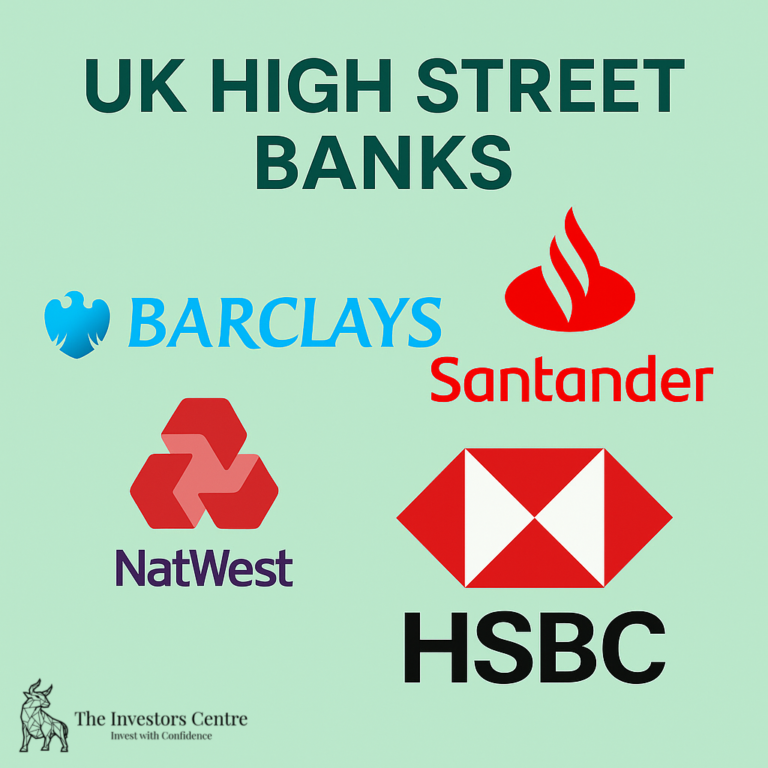Best Crypto-Friendly Banks UK (2025 Guide)

Thomas Drury
Co-Founder
Seasoned finance professional with 10+ years' experience. Chartered status holder. Proficient in CFDs, ISAs, and crypto investing. Passionate about helping others achieve financial goals.
Twitter ProfileAuthor Bio

Dom Farnell
Co-Founder
An investor and blogger with a focus on financial markets and wealth management. He’s dedicated to helping others make informed investment choices through straightforward and engaging content.
Twitter ProfileAuthor Bio
Fact Checked
How we test
At The Investors Centre, we pride ourselves on our rigorous fact-checking process. To delve deeper into our meticulous testing procedures and discover how we ensure accuracy and reliability, visit our dedicated page on how we test.
Risk Warning
Please note that the information provided by The Investors Centre is for educational purposes only and should not be considered financial advice. Always consult a professional before making any investment decisions.
Last Updated 28/04/2025
In 2025. Crypto adoption in the UK is accelerating, but bank policies haven’t always kept pace. Some banks make the process very smooth, while others still treat it as if it were 2017, full of red flags.
Quick Answer: What are the most crypto-friendly UK banks in 2025?
Revolut, Monzo, and Starling are our top picks for smooth crypto transactions. Avoid high street banks like HSBC and Santander due to frequent blocks. For the best experience, consider using a dual-banking setup with one crypto-friendly account alongside your primary bank.
Don’t invest unless you’re prepared to lose all the money you invest. This is a high-risk investment and you should not expect to be protected if something goes wrong. Take 2 mins to learn more.
What does a “crypto-friendly” UK bank look like?
A crypto friendly bank doesn’t block or delay transactions to crypto exchanges (especially those that are FCA-registered), they are transparent about their policies, and ideally, they offer modern tools that make managing your money — including crypto-related activity — as seamless as possible.
These banks offer hassle-free integration with popular exchanges like eToro. So that you don’t have to contact customer support every time you make a transaction.
Why are some UK banks still anti-crypto?
It usually comes down to risk appetite and infrastructure. Some traditional banks still view crypto as high-risk, not because they’re anti-innovation, but because these banks are heavily influenced by regulatory pressure, particularly when it comes to anti-money laundering (AML) rules and FCA compliance.
There are also concerns about fraud — banks become nervous about scams and phishing attacks linked to cryptocurrency, so they overreact and restrict everything. And let’s be honest, some of them are just slow to evolve. Their systems weren’t built for real-time, high-frequency crypto transactions, and it shows.
Tip: Before moving large amounts, always start with a small transaction to test whether a bank blocks or flags it. It’s a quick way to avoid surprises — and a frozen account.
Which Banks Are the Best for Crypto Transactions in 2025?
Here’s what I’ve learned from firsthand experience about the best banks for crypto transactions in 2025:
How do challenger banks compare for crypto users?
If you’re looking for a bank that plays nicely with crypto, challenger banks are significantly ahead of the traditional high-street giants. They are more agile, app-driven, and open to working with FCA-regulated exchanges.
Revolut
Revolut has been the most crypto-forward bank I’ve used so far. Not only does it support instant transfers to established exchanges like eToro, but it also has a built-in crypto wallet that lets you buy, sell, and hold Bitcoin and other coins right inside the app. It’s custodial (meaning you don’t control your private keys), but for casual investing or quick trades, it’s hard to beat for convenience.
I’ve never had a Revolut transaction blocked — and their real-time notifications give me peace of mind when I’m moving funds during a market dip. Just make sure your account is fully verified to avoid any friction.
Starling
Starling’s been a bit of a mixed bag for me. Transfers to regulated exchanges usually go through fine, though I’ve found that smaller, offshore platforms can still trigger a block.
On the bright side, Starling’s mobile app is excellent, and they’ve clearly made progress in relaxing restrictions — they’re just not quite as flexible as Revolut or Monzo yet.
Monzo
I’ve used it to send money multiple times without a hitch. That said, if you’re making larger or unusual transactions, you might get a security flag. To their credit, Monzo’s customer support is transparent and fast. Once, I had a flagged payment and was able to resolve it within 10 minutes via the app’s live chat.
They don’t offer built-in crypto services, but they’re solid when it comes to supporting external exchanges, especially FCA-regulated ones.
What about traditional banks?
Barclays
Barclays is probably the most “crypto-tolerant” of the big banks. They used to work directly with Coinbase, and although that partnership ended, I’ve still had success transferring crypto to and from using Barclays.
They don’t publish a specific crypto policy, but from my experience, they handle FCA-registered exchanges on a case-by-case basis. So you may be fine one week and hit a limit the next. Not ideal, but better than some.
NatWest
NatWest has been more cautious. When I tried to send funds, I hit a daily spending cap I wasn’t expecting. They do allow transfers to major exchanges, but you’ll run into low transaction limits, and they’ve issued warnings to customers about crypto risks.
In general, I’ve found NatWest to be a “maybe” bank — okay for small, infrequent crypto transactions, but not something I’d rely on if I’m moving money regularly.
HSBC and Santander
I’ve had the most trouble with HSBC and Santander. These two seem to be on a mission to block as many crypto payments as possible. I’ve had payments declined, even though I verified everything and used a debit card. Neither bank has a public-facing crypto policy, and when I contacted support, the answers were vague at best. I no longer use HSBC or Santander for any crypto-related transactions.
TLDR? If you’re active in the cryptocurrency space, I strongly recommend opting for a challenger bank. They’re more flexible, faster, and generally much more transparent when it comes to crypto transactions.
| Bank Name | Crypto Policy | FCA-Exchange Support | Notable Limits | Mobile App Quality | Notes |
|---|---|---|---|---|---|
| Revolut | Fully supportive | Yes | High limits | Excellent | Built-in crypto trading |
| Monzo | Friendly | Yes | Large transfers flagged | Excellent | Fast, transparent support |
| Starling | Semi-friendly | Yes (some) | Binance partially restricted | Excellent | Improving support stance |
| Barclays | Conditional | Yes (case-by-case) | Medium | Good | Previously eToro's partner |
| NatWest | Limited | Some | Daily caps | Good | Cautious tone, warns users |
| HSBC | Hostile | No | Many transactions blocked | Good | Actively restricts crypto activity |
| Santander | Hostile | No | Regularly blocks crypto | Good | Often flags Binance transactions |
Can You Buy Crypto Directly Through a UK Bank?
Sort of — but don’t expect most high street names to make it easy.
The only bank I’ve used that offers crypto trading inside the app is Revolut. It’s convenient since you can buy, hold, or sell a handful of major cryptocurrencies like Bitcoin, Ethereum, and a few altcoins right from your mobile banking screen. If you’re looking for a quick way to get exposure without signing up for a separate exchange, it’s a decent option.
But it’s worth being clear: while it’s accessible, it comes with a few trade-offs.
First, the spreads and fees on Revolut’s crypto trades are definitely higher than what you’d get on a dedicated exchange. It’s not outrageous, but over time, especially with larger amounts, it adds up.
Second, the token selection is limited. You won’t find every trending altcoin or niche project — just the big names.
And finally, the biggest trade-off in my opinion: Revolut uses a custodial model, which means you don’t control your crypto wallet keys. That’s fine for short-term trades or dipping your toes in, but if you’re serious about crypto, you’ll want a non-custodial wallet eventually.
Banks like Monzo and Starling don’t offer in-app crypto trading yet, but they do allow you to send funds to exchanges without too much trouble, which honestly, is often a better route if you’re looking for lower fees and more flexibility.
How Do UK Bank Policies on Crypto Compare?
There’s a huge difference between a bank that says “we support crypto” and one that actually follows through without causing delays, blocks, or headaches.
I’ve put together a side-by-side comparison based on my own experience and what I’ve seen in the crypto community — particularly when it comes to policy transparency, customer support, and real-world user feedback.
Some banks make it easy to move funds in and out of exchanges. Others? You’re lucky if your payment even clears without being flagged.
Here’s how they stack up:
| Bank Name | Crypto Stance | Transparency | Customer Support | Trustpilot Crypto Mentions | Overall Rating |
|---|---|---|---|---|---|
| Revolut | Supportive | High | Very responsive | Mostly positive | ⭐⭐⭐⭐⭐ |
| Monzo | Friendly | High | Good | Mixed (mostly positive) | ⭐⭐⭐⭐☆ |
| Starling | Improving | Medium | Good | Cautious but responsive | ⭐⭐⭐⭐ |
| NatWest | Conservative | Low | Inconsistent | Often flagged issues | ⭐⭐⭐ |
| HSBC | Unfriendly | Very low | Unhelpful | Many blocks reported | ⭐⭐ |
What Are the Risks of Using a UK Bank for Crypto?
Even in 2025, dealing with crypto through your UK bank can feel like walking a tightrope. I’ve personally had transactions flagged, delayed, and in one case, had a temporary freeze placed on my account just for sending money to a well-known exchange. And I’m not alone — I’ve heard similar stories from plenty of people in the crypto community.
The biggest risk? Your account being frozen or flagged. Banks are particularly cautious when it comes to large or frequent transfers to crypto exchanges — especially if the platform hasn’t been registered with the FCA or is based overseas. I’ve seen this happen even with relatively small amounts.
It’s frustrating, but from the bank’s point of view, they’re trying to protect against fraud, scams, and money laundering — and unfortunately, legitimate users sometimes get caught in that net.
How can I avoid these issues?
Here’s what’s worked for me:
- Stick to FCA-registered exchanges. These are the ones most UK banks recognise and tolerate.
- Keep your transfers consistent — frequent but modest amounts are less likely to raise flags than large, sudden transactions.
- Break big transfers into smaller chunks. I once had a £2,000 transfer blocked, but when I split it into two £1,000 sends a few hours apart, it went through smoothly.
- Let your bank know if you plan to trade regularly. Some challenger banks appreciate the heads-up and may even note it on your account.
Crypto and banking don’t always mix perfectly — but with a little planning, you can avoid most of the drama.
Are Business Bank Accounts Crypto-Friendly Too?
If you’re running a crypto-related business — whether that’s consulting, mining bitcoin in the UK, or even just managing client payments in Bitcoin — things get a little trickier. I’ve gone through this process myself, and I can tell you firsthand: personal accounts are generally more forgiving than business ones.
That’s not to say it’s impossible, but you’ve got to be prepared for more paperwork, more questions, and sometimes, more rejections.
Which Business Bank accounts have worked best for me?
Revolut Business has been the most crypto-tolerant by far. I’ve been able to move funds to and from exchanges without hassle, and their onboarding was relatively smooth. You still need to be clear about your business activity, but they’re far more open-minded than most traditional banks.
Tide is another option I’ve used. They don’t explicitly ban crypto, but they’re a bit more cautious. In my case, basic fiat-to-fiat transfers were fine, but I wouldn’t rely on it if your business deals directly with crypto assets.
Wise is great for international payments, especially if you’re working with clients overseas, but when it comes to crypto-related activity, they’re fairly conservative. They’ll likely let you receive payments from exchanges, but anything that looks like you’re actively trading or holding crypto on behalf of clients might raise questions.
What should you watch out for?
Be ready for enhanced due diligence. I’ve been asked for invoices, business activity descriptions, and even client contracts — all to prove the legitimacy of my transactions. It’s time-consuming, but if you’re transparent, you can usually get through it.
Also, expect longer onboarding times and the occasional rejection without much explanation.
TLDR? Stick with fintech options like Revolut Business if crypto is a regular part of your workflow.
Are UK Credit and Debit Cards Blocked for Crypto Purchases?
Most UK banks still block credit card purchases of crypto, and have done so for years. The reason? Credit cards are considered higher-risk for speculative investments, such as cryptocurrency, and banks are reluctant to assume that liability.
I’ve tried using my Barclays and HSBC credit cards for buying Bitcoin on popular platforms — and both were declined instantly. No warning, no explanation, just a flat-out block.
Debit cards, on the other hand, are a different story. I’ve had consistent success using debit cards from Monzo, and Revolut on FCA-registered exchanges like eToro. As long as the exchange is compliant and your transaction isn’t unusually large, it usually goes through without a hitch.
I also keep a Revolut card and a Wise card as backups — both of which work well for crypto purchases, especially when I’m travelling or topping up international accounts.
If you’re buying crypto with plastic, stick to debit and always check if the exchange is UK-regulated. That’ll save you a lot of hassle.
What is the Future of Banking and Crypto in the UK?
It seems that UK banks are slowly but surely warming up to crypto — especially the challenger banks. When I started buying crypto years ago, it felt like I was trying to sneak money past a security guard. Now? I can fund an exchange in under a minute using my Monzo or Revolut account.
That said, traditional banks are still lagging behind. What gives me hope is the shift in regulation. The FCA is starting to provide clearer guidance around crypto, and that’s already nudging some banks in the right direction. I wouldn’t be surprised if we see more mainstream banks offering their own crypto services in the next few years, or at least loosening the restrictions.
The upcoming rollout of central bank digital currencies (CBDCs) could also reshape things. And theirs also the role of retail demand. The more everyday people ask for access to crypto, the more pressure banks face to keep up.
Conclusion: What’s the Best Bank for Crypto in the UK?
Revolut still leads the way — not just because they offer in-app crypto services, but because their stance is clear, and they don’t make you jump through hoops. Between the in-app crypto features, smooth transfers to exchanges, and responsive support, it’s been the most reliable option in my experience.
That said, if you prefer a more traditional banking feel but still want to dip your toes into crypto, Monzo and Starling are both great alternatives.
I’ve had decent experiences with NatWest, but only for smaller transfers. Overall, I would strongly recommend a dual-banking setup. I use one account for everyday stuff and another for anything crypto-related. That way, if one bank decides to become overly cautious about crypto, you’ve still got flexibility.
FAQs
Revolut, Monzo, and Starling are among the most crypto-friendly UK banks in 2025. They allow transfers to FCA-registered exchanges like eToro and Kraken without major restrictions.
Most UK banks block credit card purchases of crypto. However, debit cards from Revolut, Monzo, and Starling are usually accepted on FCA-regulated platforms.
Yes, Revolut is a safe and user-friendly option for buying and holding crypto, though it uses a custodial wallet model — meaning you don’t control your private keys.
Crypto-friendly options for UK businesses include Revolut Business, Tide, and Wise. Traditional banks tend to be more cautious and may reject crypto-related applications.
First, contact your bank’s support team to clarify their crypto policy. You may need to use a different bank, break up large transfers, or switch to a crypto-friendly platform like Revolut.
Support for Binance varies. Some banks like Starling have restricted Binance in the past. FCA-registered exchanges such as Kraken and eToro are more widely accepted by UK banks.
Trade Smarter, not Harder
- Copy Trading
- Competetive Fee's
- Multi Asset Platforn
51% of retail CFD accounts lose money when trading CFD’s with this provider.
References:
- Financial Conduct Authority (FCA) – Cryptoassets | FCA
- Revolut – Crypto | Revolut United Kingdom
- Monzo – Is Monzo crypto-friendly?
- Starling Bank Help Centre – Policy on crypto transactions
- Trustpilot Reviews – UK Banks & Crypto Mentions
- Wise (formerly TransferWise) – Policy on crypto-related transfers
- Tide Business Banking – Crypto Guidelines
- Bank of England – Central Bank Digital Currency (CBDC) Overview
Featured Blogs
Trading and investing involve risk. The value of your investments can go up or down, and you may lose all or part of your capital. These products may not be suitable for all investors. Please ensure you fully understand the risks involved.
- Stocks, ETFs, crypto, more
- Copy top investors easily
- User & beginner friendly
- 30M+ global users
- Regulated, trusted platform











